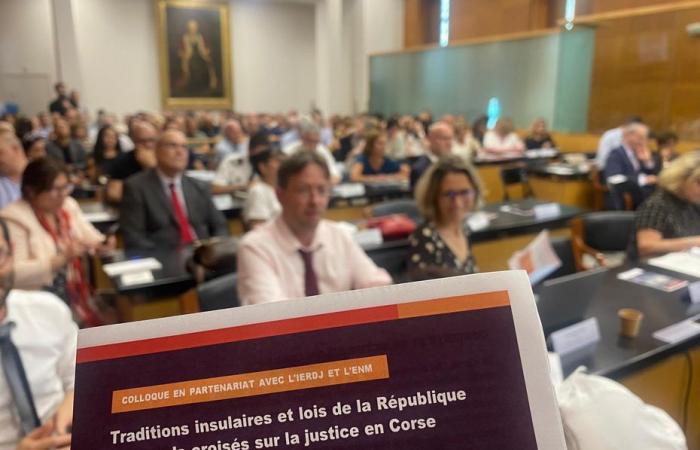
The Bastia Court of Appeal is hosting a two-day conference dedicated to justice in Corsica through its many aspects and its possible regional particularism. A meeting to which various speakers are invited, including magistrates, but also sociologists, professors, and even the bishop of Ajaccio.
How can we understand and define the complex links between violence, justice and Corsican identity? This is the whole question that a conference organized at the Bastia Court of Appeal, on June 27 and 28, intends to answer. An event organized at the initiative of the first president of the Bastia Court of Appeal, Hélène Davo, and implemented with the support, in particular, of Guillaume Desgens, advisor to the Court of Appeal. The latter answers questions from France 3 Corse ViaStella.
Why did you want to organize a conference dedicated to justice in Corsica?
Guillaume Desgens : We wanted to address a subject which we know is critical in Corsica and which is that of violence. We wanted, in this context, to extricate ourselves a little from the daily news, from the contemporary difficulties that we see everywhere in the press, and to gain a little height.
We therefore wanted to propose this historical, sociological, perhaps even a little theological, spiritual, moral approach, to show how this violence exists today in Corsican society, where it comes from, to try to understand it.
And in this attempt to understand it, the idea was really to involve all the stakeholders. It’s a sensitive subject, but one that we can talk about calmly, all together, in a caring manner. We were very careful to involve people from the region to come and think about this question with us.
The conference was organized at the initiative of Hélène Davo, first president of the Bastia Court of Appeal.
•
© Axelle Bouschon / FTV
You have chosen a particularly varied panel of speakers, with both jurists and magistrates, but also historians, sociology professors, economists and even Cardinal François Bustillo, bishop of Ajaccio. A way to diversify the angles of approach to this problem?
Guillaume Desgens : The subjects of violence are explained by historical reasons, by sociological reasons, and I think that it is important to highlight them rather than only talking about the judicial response, which is part of a regulation that we we apply it daily. The idea is that we will all collectively be a little smarter tomorrow to deliver justice.
Today, we started this conference with Jean-Claude Casanova [membre de l’Acédémie des sciences morales et politiques, économiste, directeur et cofondateur de la revue Commentaire]which focused on the historical aspect [son allocution était consacrée à la question de “Pourquoi la Corse est-elle devenue françaises ? Idées justes et idées fausses”, ndlr]/
Following Cardinal Bustillo [qui s’est exprimé sur le sujet de la “Violence, le pardon et la liberté”, ndlr]and we also had a sociological approach with Jean-Louis Fabiani [professeur de sociologie à la Central European University, qui s’est interrogé sur la Corse et la justice, “une île en deçà des lois ?” ndlr].
The judicial institution is not in its ivory tower. On the contrary, she wants to dialogue, to exchange with all the stakeholders here, so that we all think about these subjects which concern us all.
Tomorrow, we will focus on more contemporary subjects. We are going to talk about the problems of violence in Corsica, the criminal problems of the assize courts. We are also going to talk about questions of land disorder, because we wanted to expand to other questions than criminal ones.
The goal is that tomorrow, when we talk about these more contemporary subjects, we keep in mind what was said today to understand where it comes from and therefore analyze better.
We also want to send a message, which is that the judicial institution is not in its ivory tower. On the contrary, she wants to dialogue, to exchange with all the stakeholders here, so that we all think about these subjects which concern us all because there is a very strong demand, a very strong desire for justice in Corsica. We always see it.
And faced with this demand, we must try, together, to find answers, and this also involves these moments of reflection which are somewhat taken from daily news, and during which we can come together quietly.
Cardinal Bustillo was one of the speakers invited to this conference, this Thursday, June 27.
•
© Axelle Bouschon / FTV
How were the invitations to this conference perceived by the various speakers?
Guillaume Desgens : We had a very favorable reception. We did not know at the start, by putting a subject like this in the public arena, what the reception would be. But we received extremely warm feedback from all the speakers we contacted, as well as from the public. We have over 200 people present today.
All trades on the island are represented, as well as individuals. People responded and it seems to me rather positive in terms of the way the judicial institution is viewed, since people are ready to come, to listen, to discuss, and for us the objective is therefore achieved.
The conference programme and the titles of the presentations seem to point to the existence of a regional particularism regarding the treatment of justice…
Guillaume Desgens : The question that is asked, precisely, is: is there a particularism of justice in Corsica? This is what we ask the various speakers, who tell us whether for sociological, anthropological or other reasons, there may or may not be one.
As in other territories, there are specificities here that must be understood without blinding oneself, confronted and named.
We will see on Friday, with the intervention of Jean-Paul Jean [président de chambre honoraire à la cour de cassation, secrétaire général de l’Association des cours judiciaires suprêmes francophones] that there are perhaps other places in Europe, other insular zones, where there may be the same problems.
This is an open question that we are asking, but what is certain is that, as in other territories, there are specificities here that we must understand without turning a blind eye, confront them and name them.
Around 200 people attended this conference on June 27.
•
© Axelle Bouschon / FTV
This conference is a first for the Bastia Court of Appeal. Do you plan to reproduce this format in the future?
Guillaume Desgens : Of course. I think that Hélène Davo’s objective is to continue this dialogue in a whole range of ways. We can continue to think about how, it will be interesting to see if one or the other has proposals, but yes, indeed, what we are saying to ourselves is that we do not want to close the debate but to say that the we can continue to exchange ideas together, and that we have every interest in doing so.
Even if everyone does not necessarily have the same view on justice and judicial institutions, I think that this desire for justice, this need for justice and impartiality, is a need that is shared by everyone. .





